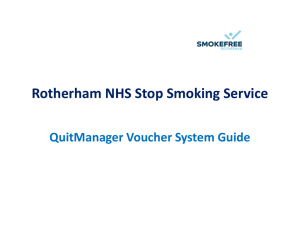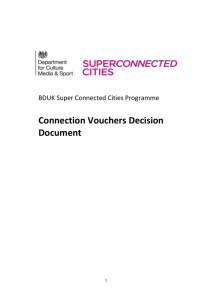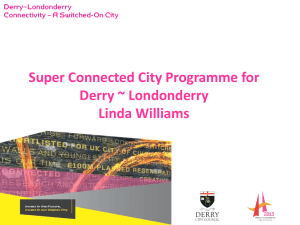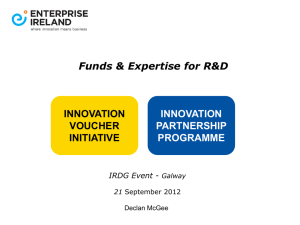Consultation on Connection Vouchers
advertisement
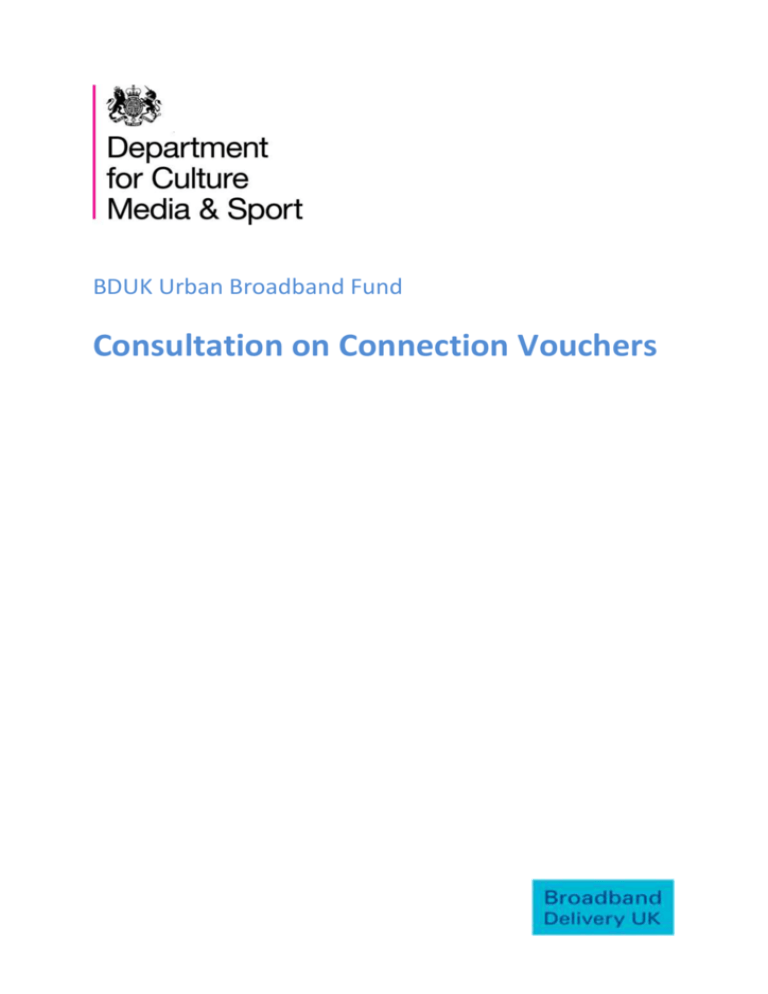
BDUK Urban Broadband Fund Consultation on Connection Vouchers Table of contents 1. Foreword from Ed Vaizey .................................................................................................................... 3 2. Introduction........................................................................................................................................ 4 2.1 2.1 2.2 3 Overview of the Urban Broadband Fund Voucher Scheme ................................................................. 9 3.1 3.2 3.3 3.4 3.5 4. Background ........................................................................................................................................................ 4 Rationale for Intervention .................................................................................................................................. 4 Consultation overview ....................................................................................................................................... 7 Core design principles ........................................................................................................................................ 9 Scheme eligibility (voucher recipients) .............................................................................................................. 9 Scheme eligibility (suppliers)............................................................................................................................ 10 Eligible expenditure for vouchers .................................................................................................................... 11 Operation of the Scheme ................................................................................................................................. 11 Consultation Questions.................................................................................................................... 13 1. Foreword from Ed Vaizey I am pleased to introduce this consultation on a connection voucher scheme we are planning as part of the Super Connected Cities Programme. The voucher scheme is intended to stimulate the market to improve digital connectivity in participating cities, in particular for the benefit of SMEs, helping cities to create and attract new jobs and investment, and make the UK a more attractive place for digital companies to come and do business. The broadband market is moving at an incredible pace. Today, businesses expect and demand faster and faster broadband to compete in the global race. Connection vouchers will be an important tool for cities in helping to address that demand. We know the costs associated with getting broadband connections featuring the reliability and speeds that businesses need can be a barrier, especially for smaller businesses. The connection voucher scheme aims to overcome this barrier, by subsidising upfront installation costs for superfast and ultrafast broadband with a primary focus on SMEs. The voucher will work with the market, will be technology neutral and therefore put the choice of connectivity into the hands of the businesses that can benefit from them. The aim is to provide the step change in connectivity that is needed for the UK to remain competitive in the 21st century digital marketplace. As part of that we are determined that the voucher scheme should generate maximum competition amongst ISPs to provide the connectivity solutions that businesses need. We are determined to get it right and that’s why this consultation is so important. We would be delighted to hear your views on the scheme and how we can ensure it is as effective as possible. Ed Vaizey UK Minister for Culture, Communications and Creative Industries 3 2 Introduction 2.1 Background 2.1.1 In 2011, the government set aside £100 million for an Urban Broadband Fund (UBF) to support the creation of up to ten ‘super-connected’ cities across the UK. This was followed in 2012 by further funding of up to £50 million for a ‘second wave’ of cities to benefit from this programme. 2.1.2 BDUK is the part of DCMS responsible for the UBF and the Super Connected Cities Programme (SCCP). SCCP aims to support economic growth and jobs across the UK by giving end-users the ability to access high-grade broadband and wireless connectivity, and to stimulate the market to go further and at a faster pace than it would otherwise have done. BDUK intends to support this development in a number of ways, for example, through the provision of greater access to faster broadband and improved wireless internet (wifi) facilities in public buildings. BDUK is also considering with cities how it might support initiatives to improve connections in existing commercial centres in order to help create new business opportunities and stimulate economic growth across the country, provided this can be managed in a manner consistent with EU State aid rules. 2.1.3 This consultation document is more narrowly focused, however, on a one aspect of the SCCP. Specifically, we are seeking views from stakeholders on our proposed demand-side initiative to launch a scheme available initially across the 22 participating cities enabling them to issue a total of up to £90 million of vouchers to broadband customers. This funding is primarily targeted at Small and Medium Enterprises (SMEs), and will pay for their initial broadband connection costs. Consideration is being given to whether it may be appropriate to extend the scheme beyond the SCCP cities. 2.1.4 The scheme will be focused on funding connection costs where there is evidence that demand exists and that connection charges are a genuine barrier to take-up. It is anticipated that this project will result in economic growth as SMEs take advantage of the opportunities presented by connecting to improved broadband services. 2.1.5 In order to test the scheme administrative arrangements, and to inform the final scheme design, we are proposing to market test a voucher scheme in several Cities over the summer. This will be launched in due course following this consultation process. We would be keen to encourage as many suppliers as possible to participate. 2.2 Rationale for Intervention 2.2.1 Since the Chancellor announced the Super Connected Cities Programme in 2011 the market has made huge strides in the deployment of high speed broadband 4 across UK cities – with increases of more than 50% in NGA network coverage in some cities and higher grade and wider coverage to come by 2015. 2.2.2 We now have an opportunity to support this rapid progress. We have adapted our programme to ensure we make the most of these advances to stimulate demand for, and take up of, high grade digital connectivity, delivering value for money and in doing so support a growth in jobs and high quality services. 2.2.3 Connectivity has, and continues to be, an important driver in the growth of SMEs enabling them to exploit new market opportunities and to utilise more efficient and effective operating models (e.g. through flexible working practices). This driver is important because SMEs are making an ever more critical contribution to the UK economy and now represent 99.9% of all UK private sector businesses, as well as approximately half of the UK’s private sector employment and turnover. Furthermore, a significant proportion of all SMEs are located within the defined boundaries of the 22 qualifying super-connected cities. It is for these reasons that we are particularly focusing on SMEs as voucher recipients. 2.2.4 Cities participating in the SCCP have argued that businesses, particularly SMEs, need particular products that the market isn’t delivering, or it does so at prohibitive prices. In turn, suppliers have argued that SMEs do not fully understand what the market can deliver and the potential benefits to their business of high-grade connectivity. Furthermore, cities have argued that there are broader benefits to the local and national economies of providing these capabilities that individual customers do not fully account for in their individual decisions. Addressing these problems will help support SMEs in their work and enable them to grow as well as the broader economy. 2.2.5 These are demand-side interventions targeted at addressing the failures identified. They are designed to work with the grain of the market and encourage maximum participation by all providers. In particular, the voucher scheme will be used to subsidise the one off connection costs necessary to obtain broadband (and other digital capability) service capability. These costs, which include for example either excess construction charges or the cost of wireless aerials, can represent one of the major cost barriers to service take-up. Removing the cost barrier will enable endusers to obtain the capability that they need from the market. We are only intending to fund the “capital” installation elements of the connection and not any on-going revenue charges. For an SME to make use of a connection charge voucher, it will need to be confident that the on-going revenue cost of the service is manageable and that any additional business benefits brought about through improved broadband services (e.g. additional sales, lower cost to trade) will outweigh this on-going cost, thereby generating overall growth. 5 2.2.6 This is a broad based, technology neutral intervention intended to assist those SMEs whose connectivity needs require a step-change1 in their current capability. In most cases it is anticipated this will be an improvement from under 30Mbit/s to over 30 Mbit/s and it will allow end-users to choose the most suitable capability to meet their needs e.g. next generation access (fixed and wireless) (NGA), leased line access, or microwave access. However we are also seeking to address feedback from SMEs that they feel reliability is just as important as speed and would like the scheme to support this kind of step-change too. We are technology neutral as to the medium over which the service is delivered, whether this is fibre, wireless or any other technology. 2.2.7 Importantly, this intervention allows communications suppliers to compete for the customer’s business on commercial terms. Voucher recipients will select a provider in the same way as if they were able to fund the connection costs themselves. Similarly, customers are afforded the same regulatory protections as they would be if they purchased the connectivity without public funding and so the same consumer and competition rules applying to the provision of these services.2 2.2.8 To support the scheme and ensure maximum value can be derived from it, BDUK and the super-connected cities intend to implement a demand assessment programme in order to inform cities and suppliers’ marketing in support of the scheme. This will include an initial demand mapping exercise to understand the demand profile for vouchers within each city and ensure that any funding is appropriately targeted. In order to address the information gap, this programme will also help inform potential voucher recipients about the uses and advantages of high-grade broadband and the value of this connectivity for their business needs. These benefits include the ability to expand the operational capability of their organisation, for example by starting to trade on-line, communicate large files quickly or perhaps to access 'cloud computing' services more effectively. These advantages and more can enable businesses to reduce operating costs and therefore support their ability to succeed and thrive. The kind of support offered may include introductory events, or technical and practical support either online or face to face and on a supplier and technology neutral basis. 2.2.4 Whilst there is a primary focus on SMEs or public sector or other social enterprises, we expect that Cities may test the suitability of vouchers residents as a secondary 1 A step change may be driven by the SME selecting a connectivity that offers it significantly new capabilities. In principle this could result in the SME choosing (i) next generation access based technologies over current generation capabilities; (ii) business grade connectivity services (e.g. leased line or microwave) over NGA; or (iii) next generation access over business grade connectivity services. 2 For example, where network access services are not considered effectively competitive, Ofcom imposes regulatory measures that are designed to remedy that market situation. In particular, Ofcom imposes certain general and specific remedies it considers appropriate to address significant market power (SMP) on defined economic markets e.g. wholesale local access markets in the UK. 6 focus where there is a demonstrable market failure or other common interest objective.3 2.3 Consultation overview 2.3.1 This consultation document describes the way we are proposing the scheme could work, on the basis of input to date from cities, SME focus groups and industry. It addresses eligibility criteria for recipients and suppliers and the type of costs that we anticipate would be funded by the voucher scheme. 2.3.2. BDUK would like to gather views about the design of the scheme as described in this document and the likely or anticipated impact of the scheme in light of our objectives. 2.3.3 This is a public consultation. We set out a number of specific questions in section 4 of this document on which we would appreciate input. If stakeholders have any concerns about the likely operation of the scheme then please set these out, together with any supporting evidence. We are particularly seeking views from: Communications Providers, and in particular Internet Service Providers (ISPs) as the vouchers will be spent with them; and SMEs as the primary targets of this scheme. 2.3.4 Where the response is from a SME please include a brief summary of your business that includes confirmation of the sector in which the company operates, the type of business, the number of employee, company location, the age of business, and trading geography (e.g. local, regional, UK, international). 2.3.5 We wish to be clear that the proposed funding and this consultation concern a demand-side initiative only: to provide a voucher to broadband consumers to use with broadband retailers to smooth, remove or reduce the barrier effect of connection costs. The voucher scheme is not a supply-side initiative. We are seeking responses to the consultation that concern features of the scheme and how it operates at the retail/customer interface. 2.3.6 The consultation will close at 5pm on Wednesday, 24 July 2013. 2.3.7 Please respond before the closing date. Responses should be sent to “urbanbroadbandfund@culture.gsi.gov.uk”. BDUK would prefer to receive responses in electronic format. However, if you do not have access to email, please respond to: 3 The UK is committed to achieving the EU objective set out in The Europe 2020 Strategy to ensure that, by 2020, (i) all Europeans have access to much higher Internet speeds of above 30 Mbps and (ii) 50 % or more of European households subscribe to Internet connections above 100 Mbit/s. 7 James Bird Urban Broadband Fund Voucher Connection Scheme Consultation BDUK Department for Culture, Media and Sport 4th Floor 100 Parliament Street London SW1A 2BQ 2.3.8 We also plan to conduct a consultation forum event on 10 July in London. Places are likely to be limited in the interests of practicality. If you would like to attend this event, please email urbanbroadbandfund@culture.gsi.gov.uk. 2.3.9 For enquiries about this document or the handling of this consultation, please contact the BDUK team at the above address or email your enquiry to james.bird@culture.gsi.gov.uk. 2.3.10 We have a strong preference for publishing consultation responses. Please mark your response as one of the following: Keep whole response confidential Keep name confidential Keep organisation confidential (if you are representing an organisation, we will publish your response under the name of that organisation.) 2.3.11 If you want only part of your response, your name, or your organisation to be confidential then please either provide BDUK with a non-confidential version of your submission or confirm whether BDUK can still publish a reference to the contents of your response (including, for any confidential parts, a general summary that does not disclose the specific information or enable you to be identified). 2.3.12 Where a submission is marked confidential, subject to paragraph 2.3.11 below, DCMS will treat the response as commercial-in-confidence and will not share any information that can be associated with your organisation outside of DCMS without your organisation’s express agreement, except where such disclosure is required by law. 2.3.13 Notwithstanding the foregoing, DCMS may disclose any such information to its professional advisors (including consultants) in connection with the UBF programme on the basis it is treated as commercial-in-confidence by such advisers as well. DCMS may also use your response to inform discussions with the European Commission on an anonymous basis unless otherwise agreed. 8 3. Overview of the Urban Broadband Fund Voucher Scheme 3.1 Core design principles 3.1.1 This section sets out a number of key design principles associated with the scheme: Principle 1 The Scheme will be designed as one overarching scheme, to operate consistently across all participating cities, while delivered locally and permitting a degree of local customisation within defined parameters. Examples of local parameters include the value of individual vouchers (within a range defined by BDUK), whether residents may be eligible for the scheme on a minority basis, and any time-sensitive factors attached to vouchers (e.g. expiry dates) and any other prioritisation criteria within a framework agreed with BDUK. Principle 2 The scheme should work within the existing market and support existing products, providing SMEs and any other voucher recipients with the widest possible choice of suppliers who can meet their needs. The Scheme will work within the existing supply market and will not favour or discriminate against any particular supplier or types of supplier. While suppliers may choose to develop new products to meet the varying demands of SMEs, suppliers do not have to develop new products to participate in the scheme nor incur significant additional costs to do so. Principle 3 Where demand exists, vouchers will focus upon support for one-off installation charges for a step change in connectivity, usually to over 30 Mbits/s but taking account of other business requirements such as reliability and upload speeds. Principle 4 Greater economic growth is likely to be delivered by SME (rather than residential) take-up. SMEs will therefore be the primary focus of the voucher scheme. Principle 5 Applicants will be free to spend their vouchers as they wish. In that regard, they may look to redeem their vouchers on an individual basis or may cooperate with other voucher recipients and other businesses to acquire the relevant connectivity. 3.2 Scheme eligibility (voucher recipients) 3.2.1 The voucher scheme will be open to SMEs defined on the following basis: 9 - Up to 249 employees, and turnover no greater than €50 million per annum and/or balance sheet of no more than €43 million;4 and - Residing within the geographical boundaries (as determined by postcode) of the relevant City.5 3.2.2 Eligible applicants will also include Small Office/Home Office (SOHO) workers6 and in certain circumstances may include commercial landlords for multi-SME premises. 3.2.3 It is presently anticipated that all eligible applicants will be awarded a voucher until the number of vouchers and/or funding has been exhausted. 3.2.4 Each City may also choose to extend the scheme to include Social Enterprises, Charities, Doctors Surgeries, Libraries or Leisure Centres, where there is a demonstrable case that this is likely to encourage greater efficiency and/or economic growth. 3.2.5 It is anticipated that some cities may also consider including residents as a secondary focus where there is a demonstrable market failure. 3.3 Scheme eligibility (suppliers) 3.3.1 SMEs will be able to redeem their vouchers against services provided by suppliers who have been previously registered for the Scheme under a “light touch” BDUK process. 3.3.2 The supplier registration or qualification process for the scheme is anticipated to involve minimal vetting against defined criteria in order to mitigate the risks of potential fraud and ensure that suppliers are capable of delivering services at a retail level to SMEs. The process for each supplier will take place once for the purpose of the scheme as a whole and is expected to involve validating the ISP's trading history, its customer base, and/or confirming membership of relevant industry bodies or trade associations. Where historic information is not available because the supplier is a new entrant, appropriate alternative checks will be put in 4 And as otherwise consistent with Commission Recommendation 2003/361/EC. (At current exchange rates the turnover figure cites in Euros equates to approximately £43 million and the balance sheet figure to approximately £37 million) 5 Qualifying SMEs must be Registered in the UK and have their trading address in the city area (defined by the SCCP project scope) which implements the scheme. Equally sole traders/partnerships must be UK tax payers, registered with HMRC. 6 SOHO’s are small enterprises that tend to operate with fewer than ten employees and operate from small commercial premises or from an office within a residence. For a SOHO to qualify for a voucher it must have the residential property listed as its trading address (which may also be the UK Registered address). SOHO’s include businesses operating as limited companies and those operating as sole traders or partnerships. In the case of the latter two legal forms, it is the Director’s or Partner’s listed address (for tax purposes) that will be eligible for connection under the voucher scheme. In instances where SOHO’s sub-contract work to selfemployed ‘staff’ these individuals will themselves qualify for a voucher. 10 place to validate capability. New suppliers will be accepted throughout the lifetime of the scheme, and no restriction will be placed on the number of qualified suppliers. 3.2.3 It is anticipated and hoped that a wide range of potential suppliers will participate across the superconnected cities, with varying degrees of capability at local and national level. 3.2.4 The choice of service provider is solely at the discretion of the SME (or other voucher recipient) who will be free, subject to paragraph 3.5.2 to select a registered service provider who best serves their connectivity needs within their specific location. 3.4 Eligible expenditure for vouchers 3.4.1 The voucher scheme will be funded by the Urban Broadband Fund, which can only be used on items of capital expenditure. Vouchers will fund (or part-fund) the oneoff connection charge associated with the provision of enhanced connectivity. 3.4.2 The voucher will not fund recurring charges or subscriptions, which will remain the sole responsibility of the voucher recipient. 3.4.3 Consistent with the current market structure, the contract relationship at retail level will remain between the SME or other voucher recipient and the service provider (ISP). The Cities and BDUK will simply provide funding to the SME to reduce or discharge the liability of the voucher recipient for connection charges. 3.4.4 Vouchers will have a defined value, set by each City. Across all the SCCP, there is expected to be a minimum and maximum value, currently anticipated to be between £250 and £3,000. 3.5 Operation of the Scheme 3.5.1 Applicants will be able to apply via their local city to confirm their eligibility for the scheme. After eligibility checking, successful applicants will be notified of the maximum value of their connection voucher, along with any other conditions (e.g. expiry dates). Additionally, cities may choose to proactively notify SMEs of their eligibility and the value of their voucher offer. It is also anticipated that suppliers will wish to conduct local marketing to promote their own services and encourage SMEs to apply for vouchers. Cities will provide demand profiling data to suppliers on an open and non-discriminatory basis to support this activity. 3.5.2 Successful voucher applicants will be notified of registered suppliers who have the capability to support their requirements. Applicants will be responsible for engaging with suppliers to invite them to make individual commercial offers. 11 Dependent upon the value of the voucher awarded, applicants may be required to obtain at least two quotes. 3.5.3 Neither the Cities nor BDUK will promote particular suppliers in favour of others or offer advice on supplier choices. Registered suppliers will be required to market to voucher recipients competitively and not to act in any way that would restrict or distort competition. 3.5.4 In conjunction with the above, it is proposed that BDUK will provide an on-line “information portal” which will promote the Scheme and act as a signpost to the relevant city scheme. The portal will also provide a repository for cities to provide demand profiling data so it can be made available to suppliers on an open and transparent basis. 3.5.5 Once a successful voucher applicant is in receipt of a satisfactory commercial offer, details will be provided to the local city and the voucher applicant will confirm their acceptance with the supplier and with the local city. 3.5.6 The supplier will then install the agreed service and provide an invoice to the voucher applicant.7 Upon proof of installation and provision of a copy invoice provided by the applicant, the local city will then transfer funds to the supplier on behalf of the applicant, up to the agreed voucher value and for the agreed cost elements (i.e. the particular one-off supplier connection charges agreed). BDUK will then grant funds to the local city in arrears in respect of vouchers paid. 3.5.7 The primary roles and responsibilities of central government and each local city can be summarized by the following table: Activity Core scheme design Specification of local parameters Provision of guidance documentation Provision of central “Information Portal” Provision of funding to cities Scheme administration Delivery of anti-fraud checks Local demand stimulation (for the takeup of vouchers) Payments to suppliers Scheme reporting (local level) Scheme reporting (programme level) Central Government √ Local City √ √ √ √ √ √ √ √ √ √ 7 New connections should to be provided within normal commercial timescales as specified in the terms and conditions of contract. 12 4. Consultation Questions We particularly seek views from SMEs and communications providers (in particular ISPs), regarding the following questions: Question 1: What methods do you consider most useful and practical in the context of stimulating awareness and demand for a broadband connection scheme? Question 2: If you are an SME, ISP or network operator: (a) would you be keen to participate in the voucher scheme on the basis that we have set out in this consultation? (b) In addition to the elements described in this consultation document, what further steps, if any, would BDUK need to take to ensure your participation in the scheme (e.g. broadening the categories of eligible end-users)? Question 3: Does BDUK need to place any conditions or criteria on the vouchers to ensure effective take-up by end-users? Question 4: Which costs do you consider should eligible for funding by the connection voucher? Question 5: Do you think the current value range proposed for the connection vouchers (£250 to £3,000) is appropriate? Question 6: Should a contribution to the connectivity costs be required of end-users or should the scheme support the total costs of connectivity? If you consider a contribution to be appropriate please explain why and confirm which end-user should be required to contribute (e.g. SMEs, residents etc.), and what the minimum contribution should be. Question 7: Do you agree that a ‘portal’ (web based interface) providing is the best mechanism to enable end-user’s to meet potential suppliers? If so, what information do you consider should be provided on the ‘portal’? Question 8: Other than the use of a portal, what steps could be taken by BDUK to maximise the effectiveness and efficiency of the scheme for suppliers and end-users? Question 9: The measures that BDUK is proposing are designed to stimulate the take-up of high-grade connectivity demanded by SMEs. These measures and the voucher scheme in particular have been formulated to work with the current regulatory framework and State aid rules. Please confirm: (a) Whether and how you consider these measures might result in a distortion to competition and what, if any, adjustments to the scheme might serve to correct for such distortions; and (b) Whether the operation of the proposed scheme is likely to give rise to any regulatory concerns. 13 Question 10: What methods do you consider might be most useful and practical to monitor the Voucher Scheme and evaluate its outcomes? Question 11: Are there any other aspects that directly relate to BDUK’s proposed demand-side measures that you would like to raise? 14
